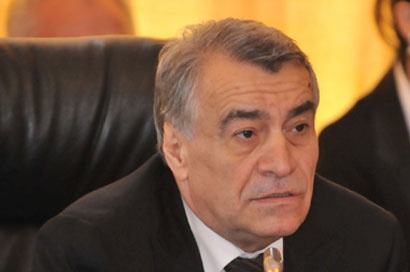Investments in Azerbaijan's energy distribution network crucial

By Aynur Karimova
Azerbaijan's Energy Minister Natig Aliyev has voiced the country’s needs in investments to bring the energy distribution network into operation.
The minister also did not exclude the possibility of privatizations in the energy sector.
He told journalists on February 1 that subsidiary and service companies, as well as enterprises operating in the energy sector, not the producing ones, may be privatized.
“It is necessary to make $4 billion investment for the existing energy distribution network to meet international standards,” he said. “In case of privatization, it is unlikely that individuals will be able to make such investment, so only large companies can do it.”
Aliyev believes that for this reason, it is early to talk about privatization of energy distribution companies and producers.
“At the same time, subsidiary companies in the power industry sphere can be privatized,” he added.
Recently, President Ilham Aliyev has noted the need to prepare a broad program of privatization, attracting both foreign and local investors, to improve the business environment and accelerate business revival in Azerbaijan.
Last year some 685 small state enterprises, unfinished buildings, vehicles, 456 plots of land, and 20 joint-stock companies were privatized in the country.
Finance Minister Samir Sharifov recently noted this year Azerbaijan expects to receive some 100 million manats ($61.35 million) from the privatization of state property.
Drop in oil prices cannot last for long
Aliyev believes that falling oil prices cannot last for long. He said the current low oil prices are caused by economic reasons rather than political.
“The oil price cannot remain at the current level for long, because today these prices are caused not by economic, but political reasons, and President Ilham Aliyev also noted this. This harms not only oil exporters but also importers. These political games must end, and only economy can dictate which prices for oil and energy in general should be. This price should be acceptable for both importers and exporters,” he said.
Aliyev also stated that it is important for all oil-exporting countries unite together and discuss the processes taking place in the world and their impact on the global economy.
“Today it is necessary that both the OPEC countries and countries outside the Cartel come together to some sort of agreement,” he said. “One needs to understand what the optimal price for oil on world markets is. OPEC countries have repeatedly discussed this, and noted at the time that the optimal price for oil is $70-$80 per barrel for both exporters and importers.”
Aliyev went on to add that the situation with prices will change maximum before late 2016.
“It’s difficult to make any specific predictions,” the minister said. “In order to make any forecast, it is necessary to analyze more than 20 factors. At one time, when in 1998 the prices of oil fell to $10 a barrel, all experts said that this situation would last at least until 2002. But after 1999 the prices of oil began to rise, and even passed the barrier of $100.”
Aliyev expressed confidence that major changes should take place this year, "because no global economy can stand the current situation.”
Half of works on Shah Deniz-2 completed
Aliyev also spoke about works conducted as part of the Shah Deniz-2 project. He said that over 50 percent of works on this project has been already completed.
He also added that a lot of work has been done on the expansion of the South Caucasus gas pipeline as well.
"More than 20 percent of the pipeline has been built. The construction of compressor stations in the territory of Georgia has been started. We have repeatedly reported that works are underway ahead of schedule. The process of delivery of pipes for the Trans-Anatolian gas pipeline has been completed, and welding works have been started. We plan to start construction of the Trans-Adriatic pipeline this year," the minister stated.
The gas which will be produced at the second stage of development of the giant Shah Deniz field will be exported to Turkey and to the European markets through the expansion of the South Caucasus gas pipeline and the construction of the TANAP and TAP pipelines.
It is expected that gas production will increase from 9 billion to 16 billion cubic meters per year as part of the Shah Deniz-2.
Shah Deniz Stage 2 gas will make a 3,500 kilometer journey from the Caspian Sea into Europe. This requires upgrading the existing infrastructure and the development of a chain of new pipelines.
The Southern Gas Corridor is set to change the energy map of the entire region, connecting gas supplies in the Caspian to markets in Europe for the very first time.
The first gas supplies through the corridor to Georgia and Turkey are given a target date of late 2018. Gas deliveries to Europe are expected just over a year after the first gas is produced offshore in Azerbaijan.
The Southern Gas Corridor pipeline system has been designed to be scalable to twice its initial capacity to accommodate additional gas supplies in the future.
--
Aynur Karimova is AzerNews’ staff journalist, follow her on Twitter: @Aynur_Karimova
Follow us on Twitter @AzerNewsAz
Here we are to serve you with news right now. It does not cost much, but worth your attention.
Choose to support open, independent, quality journalism and subscribe on a monthly basis.
By subscribing to our online newspaper, you can have full digital access to all news, analysis, and much more.
You can also follow AzerNEWS on Twitter @AzerNewsAz or Facebook @AzerNewsNewspaper
Thank you!
